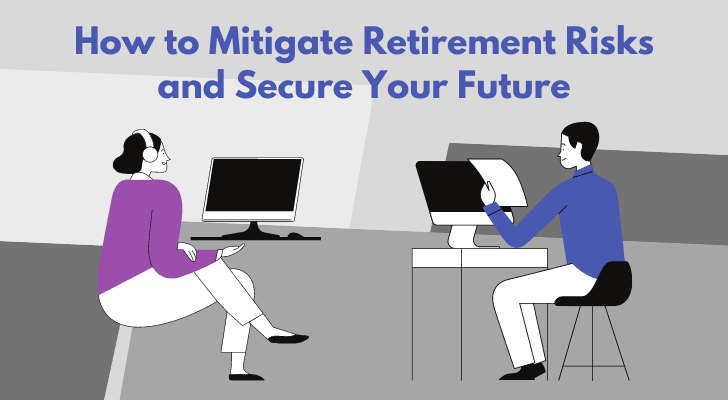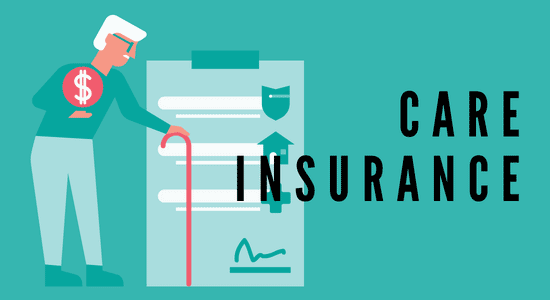Are you one of the many people worried about your future retirement? Do you fear running out of money or not having enough to cover unexpected expenses when you retire? Well, I can tell you that there are indeed risks that come with retirement. Running out of money before the end of your life. With people living longer than ever before, it's important to plan for a retirement that could last 20, 30, or even 40 years.
So when is the time to start taking control and mitigating those retirement risks? The answer is, as soon as you become aware of them, which is now, really.

What Are the Risks of Retirement?
Retirement risks may be difficult to anticipate until you are actually retired. For example, we know that life expectancy is increasing, and healthcare costs tend to rise over time.
So even if you are young and far from retirement age, you’d better start planning and saving early to help mitigate those risks. You’d also better start cultivating hobbies and interests that will help you stay engaged and connected to others throughout your life.
Unexpected events could impact your retirement plans, so be flexible and adaptable, and revisit your retirement plan regularly to make sure it still aligns with your goals and needs. Here are some of the more common risks;
Longevity Risk - Outliving Your Savings
This is a major concern for many retirees, as they may not have sufficient funds to last throughout their lifetime. This is especially true if they experience unexpected medical expenses or other unanticipated costs.
Inflation
Over time, prices for goods and services tend to increase, which means that each dollar saved today will be worth less in the future.
But the cost of living is increasing at an incredible rate right now, and if retirement savings aren't keeping pace, you won’t be able to maintain the same standard of living.
Market volatility
Another key retirement risk is market volatility, which refers to the ups and downs of the stock market. This can have a major impact on retirees' investment portfolios, as well as their ability to generate income in retirement.
Health Issues
No need to tell you this but as we age, our bodies are more prone to illness and injury, and healthcare costs can quickly eat into retirement savings. So you really should have a plan in place for healthcare expenses, including long-term care if needed.
Social Isolation
Many retirees find that they miss the social interaction that came with their work life. It's important to stay active and engaged in activities and hobbies that bring fulfillment and socialization.
How to Mitigate Retirement Risks
I can tell you, here are the steps I’ve taken to start taking now to mitigate these risks, so I would ensure a more financially secure retirement. Just some suggestions, but I hope they will help.
Diversify Your Savings
Diversify your retirement savings across a mix of asset classes, including stocks, bonds, and cash. This will help protect your portfolio from the ups and downs of the stock market and provide some stability in retirement.
It’s all to do with increasing the likelihood of meeting your long-term financial goals. Here are some ways you can diversify your retirement savings:
- Invest in different types of assets: One way to diversify is to invest in a mix of stocks, bonds, and other asset classes such as real estate, commodities, or alternative investments. This can help reduce the impact of market volatility on your portfolio.
- Spread your investments across different industries and sectors: Another way to diversify is to invest in a range of companies across different industries and sectors. This can help spread your risk and reduce the impact of a downturn in any one sector.
- Consider international investments: Investing in international markets can help you access new opportunities and spread your risk across different countries and economies.
- Utilize different types of retirement accounts: You can also diversify by using different types of retirement accounts, such as a traditional IRA, a Roth IRA, or a 401(k). Each of these accounts has different tax benefits and investment options, so using a mix of them can help you diversify your retirement savings.
- Regularly review and rebalance your portfolio: Finally, it's important to regularly review your portfolio and make adjustments as needed to ensure that it remains diversified and aligned with your long-term goals.
Whenever you get a moment, ask an independent financial advisor to develop a customized plan that takes into account your unique circumstances and risk tolerance.

Care Insurance
Another way to mitigate retirement risks is to purchase long-term care insurance. This type of insurance can help cover the cost of extended care needs in retirement, such as home health care or nursing home care.
The insurance allows you to ensure that you have the resources you need to stay healthy and independent in retirement.
The cost of long-term care services includes nursing home care, in-home care, or assisted living, which may not be covered by traditional health insurance or Medicare.
Here are some things to consider when thinking about purchasing long-term care insurance:
- Evaluate your risk: Consider your family history and your own health history, as well as your age, lifestyle, and overall health, to determine your likelihood of needing long-term care in the future.
- Consider the cost: Long-term care insurance can be expensive, so it's important to consider whether it fits within your budget. You may want to consider purchasing a policy when you are younger, as premiums tend to be lower at that time.
- Understand the policy: It's important to carefully review the terms of any long-term care insurance policy you are considering, including the types of services covered, any limitations or exclusions, and the cost of premiums and benefits.
- Consider working with a financial advisor: A financial advisor can help you evaluate your options and determine whether long-term care insurance is right for you, as well as help you develop a comprehensive retirement plan that takes into account your long-term care needs.
The insurance will protect your retirement savings and ensure that you have the resources to cover the cost of long-term care services. Again, work with a trusted financial advisor to develop a plan that is right for you.
Personalized Retirement Plan
Here’s another thing that you should consider working with a financial advisor. A good personalized retirement plan will take into account your unique circumstances and goals.
Why now? Because when you get old, it’ll be harder to make decisions about how to best allocate your resources. I’m glad I did mine a few times during my younger days. So you want a professional to give you peace of mind that you're on track to reach your retirement goals. Here’s what you can do to develop a personalized retirement plan:
- Decide how you want your retirement life to be realistically: Consider what you want your retirement lifestyle to look like and the expenses you will incur in retirements, such as housing, healthcare, and travel.
- Assess your retirement income sources: Take stock of your retirement income sources, including Social Security, any employer-sponsored retirement plans, and other investments, such as individual retirement accounts (IRAs) or real estate.
- Evaluate your retirement savings: Calculate how much you will need to save for retirement, based on your retirement goals and income sources, taking into account inflation and other factors.
- Develop a retirement savings plan: Develop a plan for saving for retirement, based on your retirement goals and the amount of money you will need to save.
- Consider tax strategies: Explore tax-advantaged retirement savings options, such as traditional and Roth IRAs, as well as other tax-efficient strategies.
- Plan for healthcare costs: Consider how you will pay for healthcare costs in retirement, such as long-term care insurance or a health savings account (HSA).
- Review and adjust your plan regularly: It's important to regularly review your retirement plan and adjust it as needed, based on changes in your circumstances, goals, or market conditions.
Working with a financial advisor can be a valuable resource in developing a personalized retirement plan that takes into account your unique circumstances and goals. They can provide guidance on retirement savings strategies, tax planning, investment management, and other aspects of retirement planning.

Stay Healthy and Active
What you normally do to keep fit when you are young will be increasingly difficult after you pass a certain age (45+). After all, we're not as spry as we used to be, and our bodies don't always work the way they should.
But that's no excuse to let ourselves go! To stay fit, I make sure to get plenty of exercises every day. I take brisk walks around the neighborhood, do some light weightlifting, and practice yoga to keep my muscles limber.
I also watch what I eat, making sure to include plenty of fruits, vegetables, and whole grains in my diet, while avoiding too much sugar and processed foods.
But perhaps most importantly, I stay mentally active too. I read books, work on IQ tests, and engage in lively conversations with friends and family. Keeping the mind sharp is just as important as keeping the body fit, if you ask me.
So while it may be a bit harder to stay healthy and active in retirement, with a little bit of effort and determination, it's definitely possible.
Start Working Online
Think about your personal circumstances again. If you have a few hours to spare each day, or even 30-60 minutes each day, you can start working online to earn supplement your income for retirement.
Things to consider may be;
- Flexibility: Working online can offer more flexibility in terms of schedule and location, which can be especially beneficial for those nearing retirement age.
- Skills: Depending on the type of work you choose, working online can help you develop new skills that may be useful in retirement, such as digital marketing, web development, or online teaching.
- Risks: Working online may not be a stable or reliable source of income, and there are risks such as fluctuating demand, competition, and scams. It's important to do your research and make informed decisions before committing to any online work.
- Taxes and Benefits: If you are working as an independent contractor or freelancer, you will be responsible for paying self-employment taxes and may not be eligible for certain retirement benefits.
As you can see, there are positive and negative points, but for me, the negatives are minor. Earning a bigger income and losing small retirement benefits is better than receiving small benefits by doing nothing productive every day.
Affiliate Marketing Is Not Dead Yet
Some people say affiliate marketing is dead because people are more skeptical of what’s being introduced online, and the industry is too competitive. But as an affiliate marketer myself, it’s still a good way to start making money online, especially for those who don't have any particular skills to sell.
To get started with affiliate marketing, all you need is a website or YouTube channel where you can promote products of your choice. You can sign up for affiliate programs for free and start promoting brands that are relevant to your niche.
A variety of methods are available, such as writing or videoing product reviews, and creating tutorials or guides, while sharing affiliate links with your followers.
Affiliate marketing does require some effort to be successful. You may struggle a bit in the beginning, but that's normal for any business. You'll need to build a following, create high-quality content, and promote products or services that your audience is interested in.
If you're willing to put in the work, affiliate marketing is a way to start, and if you decide it’s not for you, then you can use the skills you’ve learned from it and continue to earn extra income using different methods. The efforts you make today will definitely pay off in years to come.
Conclusion
Retirement is a major milestone and an important part of your financial planning. It’s essential to plan ahead for it, mitigating all the risks you can think of. While some retirement risks are unavoidable, there are steps you can take now to secure your future and ensure that you have enough funds during retirement.
Start by creating an emergency fund, diversifying your investments, staying up-to-date on taxes and benefits laws related to retirement saving accounts, as well as preparing a budget for when you do retire. And start working online! I really hope that you can achieve financial stability during your golden years, whatever happens in the future.
Did You Know You Already Have A LOT To Sell?
So What's Your Problem?

